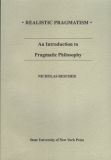用户登陆搜 索 |
查看图书
图书目录: Preface
Introduction Chapter One: Setting the Stage 1. The Historical Background 2. The Diversity of Pragmatisms 3. The Meaning of Pragmatism's Variations Chapter Two: Pragmatism in Crisis 1. The Guiding Idea of the Pragmatic Program 2. The Jamesean Transformation and its Aftermath 3. Postmodern Pragmatism and its Contrary 4. AReturn to the Peircean Roots 5. Three Traditional Objections to Pragmatism 6. The Turn to Methodological Pragmatism Chapter Three: Methodological Pragmatism in the Cognitive Domain 1. Aspects of Methodology: Teleology 2. The Special Case of Cognitive Methodology: The Methodologically Pragmatic Validation of Knowledge Claims 3. Why this Link Between Pragmatic Efficacy and Truthfulness? 4. The Generality of the Methodological Approach Overcomes Various Objections 5. How the Present Methodological Approach Contrasts with that of Peirce Chapter Four: Fallibilism and the Pragmatic Epistemology of Science 1. Monitoring the Adequacy of Science 2. The Arbitrament of Praxis 3. The Fallibilist Perspective Chapter Five: Metaphysical Realism and the Pragmatic Basis of Objectivity 1. The Existential Component of Realism 2. Realism in its Regulative / Pragmatic Aspect 3. Realism and Objectivity as a Requisite of Communication 4. Retrojustification: The Wisdom of Hindsight Chapter Six: Pragmatism and the Theory of Language: Use Conditions vs. Truth Conditions 1. Truth-Conditions vs. Use-Conditions 2. The "Logic" of Use-Conditions: Pragmatics vs. Semantics 3. Semantics, Pragmatics, and the Issue of Meaning 4. The Duality of Truth and Usage Roots in the Cognitive Opacity of Real Things 5. The Inductive Aspect 6. Advantages of a Pragmatic Approach to Meaning Chapter Seven: Pragmatism and Value 1. Purposiveness and Values 2. Evaluative Rationality and Appropriate Ends: Against the Humean Conception of Reason 3. The Crucial Role of Interests and Needs: Wants and Preferences are not Enough 4. The Pragmatic Aspect Chapter Eight: Morality, Pragmatism, and the Obligations of Personhood 1. The Functional Nature of Morality 2. Is Rational Controversy About Morality Possible? 3. The Ethics of Collaboration and Communication in Science as an Instance 4. On the Rationale of Moral Obligation 5. Obligations and Interest 6. The Pragmatic Dimension Chapter Nine: Pragmatism and Philosophy 1. Against Philosophical Scepticism 2. Philosophizing as Truth-Estimative Conjecture 3. Pragmatism as a Via Media 4. Is Circularity a Problem? 5. Is Fragmentaion a Problem? 6. The Advantages of Realistic Over Relativistic Pragmatism 7. The Complexity of Pragmatism Name Index |

